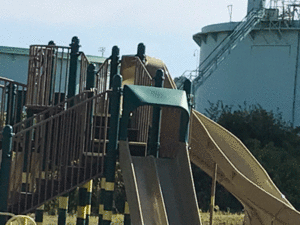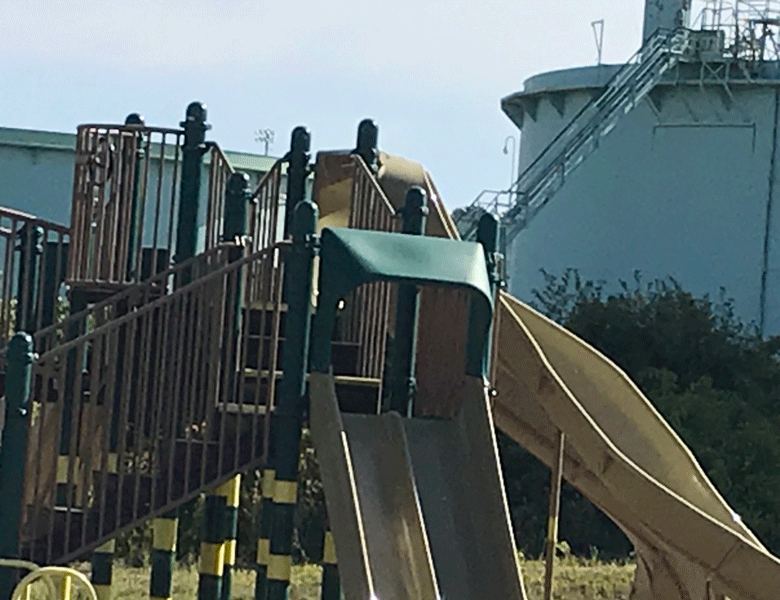South Portland’s industrial waterfront lies at the mouth of the Fore River, across a widening expanse of water from Portland’s busy commercial district. Protected, and with deep water anchorage, it’s as prime as it gets.

But as the shoreline turns to the southeast, that industrial character changes. Near the boundary with Cape Elizabeth lies Willard Beach, with its views of the islands. North and west of the beach is Bug Light Park, located on the site of a former World War II shipyard. It marks the eastern end of the Greenbelt Walkway that stretches westwards towards the Scarborough town line.
At about its halfway point, the walkway passes a tank farm operated by Global Partners LLC. Farther up the shore of the river are the tank farms where Sprague Resources stores primarily heavy No. 6 fuel oil and asphalt. Those tanks are often heated to keep the contents liquid.
In all, the facility hosts some 120 industrial tanks, virtually all used to store petroleum products. According to figures compiled by the grassroots organization Protect South Portland, those tanks are licensed by the Maine Department of Environmental Protection to emit some 590 tons of volatile organic compounds (VOCs) and 104 tons of hazardous air pollutants (HAPs) yearly.
To a visitor passing through South Portland, the most obvious sign of those emissions may be a foul odor which, in some weather conditions, can be evident even across the water in Portland, according to Espahbad Dodd, a self-described climate activist who lives in the city’s West End.
About a decade ago, the U.S. Environmental Protection Agency began an investigation of hazardous emissions from tank farms throughout New England. In Maine, the investigation focused on Global’s tanks in South Portland and on Sprague tanks there and in Searsport.
In December 2019, after Global had already settled with the EPA, Sprague accepted the terms of a proposed consent decree, settling charges arising from the EPA investigation that it had violated the federal Clean Air Act and various federal and state regulations aimed at controlling the emission of VOCs at its facilities in Massachusetts, Rhode Island, and in Maine, including the South Portland tanks.
On Jan. 15, after an extended public comment period, the federal district court in Massachusetts approved the decree. Among its other provisions, the consent decree requires Sprague to install “carbon bed systems” in order “to reduce odors” emanating from its No. 6 oil and asphalt tanks in South Portland. Sprague also agreed to obtain all necessary air quality-related permits required by the city or DEP.
But South Portland resident Roberta Zuckerman, who has been involved with the city’s clean air efforts for nearly a decade, said the consent decree misses the point. Many of the city’s tanks are located close to schools, playgrounds or senior housing, she said.
“Odors are not the issue,” she said, but rather it is “concerns about the issues of VOCs and hazardous air emissions,” among them such known carcinogens as benzene, and their impact on public health.
Another problem, Zuckerman said, is that while the Maine DEP exercises its authority to monitor potentially hazardous emissions, the agency has no authority to monitor odors and appears disinclined to do any monitoring beyond what state law, or the EPA, requires.
“It’s a very subjective sort of thing,” she said.
In a lengthy report to the legislature filed in January, DEP confirmed that it had no authority under state law to monitor for odors under its air quality monitoring and permitting process.
On March 2, the South Portland Clean Air Advisory Committee presented its final report to the city council. According to the committee, installation of equipment designed to control the flow of odors from the tanks required by the consent decree will also reduce VOCs emissions. So far, no work on the odor control systems has begun, and there appears to be no established timetable for its start.
In a March 3 email, Shana Hoch, Sprague’s managing director for marketing and customer experience, wrote: “The consent decree is now finalized, and subject to coming to a consensus with the town and DEP, we will obtain any necessary permits, construct the approved solution, and build a timeline for implementation.





